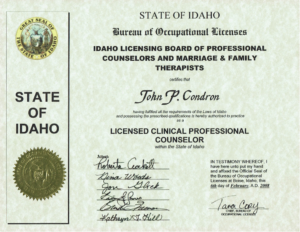Licensure
 Only persons who have been granted permission by the state or jurisdiction in which the client is located are permitted to provide regulated mental health services. These include Counselors, Marriage and Family Therapists, Social Workers, Behavior Analysts and Psychologists. The word “license” essentially means “permission.” Every US state, as well as the District of Columbia, Puerto Rico, and some other countries, regulates the practice of mental health professions.
Only persons who have been granted permission by the state or jurisdiction in which the client is located are permitted to provide regulated mental health services. These include Counselors, Marriage and Family Therapists, Social Workers, Behavior Analysts and Psychologists. The word “license” essentially means “permission.” Every US state, as well as the District of Columbia, Puerto Rico, and some other countries, regulates the practice of mental health professions.
Note that people who refer to themselves as “Coaches,” “Life Coaches,” “Therapists,” “Psychotherapists,” “or “Hypnotherapists” are often unlicensed practitioners. None of those titles is regulated by any state or jurisdiction of which I am aware. This is a loophole in the law that allows unqualified practitioners to prey on the public. I’m not saying that everyone who practices under one of these titles is unscrupulous; only that the State provides no protection for you as the client if you are harmed by one of these people.
I am currently licensed by the States of Idaho, Utah, Arizona, Colorado, and Utah to provide counseling services to people located in those states. I am also registered as an Out-of-State Telehealth Provider by the State of Florida. I cannot provide professional counseling services to persons located outside of those jurisdictions at the time of the session, unless they are in a foreign country that does not regulate the practice of counseling. (Click on the licenses listed below to verify licensure)
- Idaho – Licensed Clinical Professional Counselor (LCPC-3868)
- Utah – Licensed Clinical Mental Health Counselor (LCMHC-11743381-6004)
- Arizona – Licensed Professional Counselor (LPC-19205)
- Colorado – Licensed Professional Counselor (LPC-0016486)
- Washington – Licensed Mental Health Counselor (LH-61090274)
- Florida – Out-of-State Telehealth Registration (Profession 9646 – ID 393)
I am registered to practice in the states of Wyoming and Massachusetts for the duration of the COVID-19 state of emergency. That means that if I start working with someone in one of those states, I might have to discontinue services abruptly and without warning, when the Governor lifts the state of emergency.
The important question with regard to licensure is “where is the client located at the time of the service?” For example, if a person lives in Idaho but travels to New York, even though I do most of my work via secure video (telehealth), I am not licensed in New York state, so would be unable to work with that person while there (New York is unusually aggressive about enforcing this rule).
Certification
Certification is different from licensure. Generally, certifications are issued by non-governmental organizations. They are voluntary, and provide evidence that some particular act has been completed. Generally speaking, certification is not a requirement for one to practice in a profession, and the loss of a certificate does not prevent one from practicing as long as they are licensed. Usually, it is a self-governing standard taken to inform one’s peers, consumers, and other professionals in their field of practice of the training they have undertaken.
I have voluntarily earned the following certifications. Click on the name of the credential to identify the granting entity:
- Master Addiction Counselor (MAC-255017)
- National Certified Counselor (NCC-255017)
- Certified Fellow in Clinical Hypnotherapy
- Certified Clinical Trauma Professional
- Trauma Focused Cognitive Behavior Therapist
- Certified Dialectical Behavior Therapist
- Board Certified Telemental Health Provider (#127)
- US Dept. of Transportation Substance Abuse Professional
- Approved Clinical Supervisor – BPA Substance Use Disorders programs
- Registered Supervisor – Idaho Board of Professional Counselors and Marriage and Family Therapists
- Registered Supervisor – Idaho Board of Alcohol/Drug Counselor Certification
Note that certification is not the same as state licensing or registration. The former simply “certifies” that the individual was able to do some specific thing at some specific time. Standards for certification range from rigorous to laughable. For example, it is possible to become a “Fully Accredited Master Hypnotherapist” in a single weekend! All of the credentials listed above are respected in the mental health field, and required significant investments of time, study and effort.